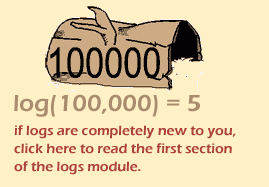Logs = Exponent-busters
In a word: when you have a problem with exponents, try logs. The great thing about logs is that they take everything down a notch. Multiplication gets busted down to addition. Exponents get busted down to multiplication.
If you're already comfortable with manipulating log expressions, just skip to the next page. Otherwise, here is a quick reminder and attempt to rationalize that exponent-busting magic.
 What is a log?
What is a log?
What logs tell us is the magnitude of a number -- how much space the number takes up on paper.
If the log is 3, then the original number is a '1' followed by three zeros.
If the log is 4, then the original number is a '1' followed by four zeros.
If the log is between 3 and 4, then the original number is something bigger than '1' followed by three more digits.
How do logs turn multiplication into addition?
So far so good. Let's take it another step. When we multiply 2 normal numbers, we're basically ADDING their magnitudes. Therefore
 100 * 1000 = 100,000
100 * 1000 = 100,000
The number 100 has 2 zeros, 1000 has 3 zeros, and their product has 2+3=5 zeros. By not-coincidence, the MAGNITUDE of 100 is 2, the magnitude of 1000 is 3, and the magnitude of 100,000 is 5.
The moral of the story so far: logs allow us to deal with numbers as magnitude, so it turns multiplication into addition.
How do logs turn exponents into multiplication?
As you know, using an exponent is a short-hand way of indicating repeated multiplication.
25 = 2 * 2 * 2 * 2 * 2
 So logs turn (repeated) multiplication into (repeated) addition
So logs turn (repeated) multiplication into (repeated) addition
log(25) =
log(2 * 2 * 2 * 2 * 2) =
log(2) + log(2) + log(2) + log(2) + log(2)
Another way of saying "repeated addition" is "multiplication"
log(25) = 5* log(2)
So the whole moral of the story is: logs knock exponents down to multiplication, and they knock multiplication down to addition.
Bottom line: logs are a biologist's best friend...!
Copyright University of Maryland, 2007
You may link to this site for educational purposes.
Please do not copy without permission
requests/questions/feedback email: mathbench@umd.edu